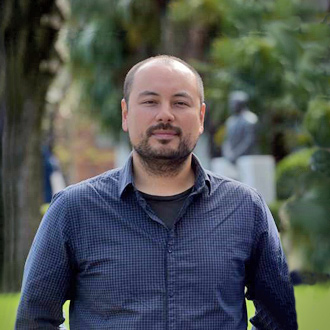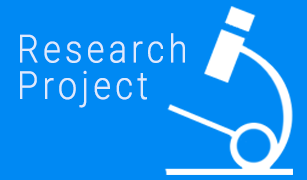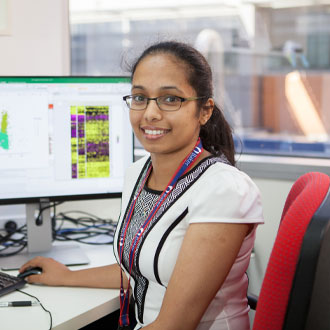About the Systems Genomics laboratory
Technological advances have continued to drive the study of biology towards the statistical and computational sciences. We are now able to differentiate and quantify biomolecules at levels previously unimaginable, allowing us to study their interactions and relationships to health and disease in an unbiased, systems-level manner.
A corollary of this transformation is that artificial intelligence (AI) can now be used to tease out underlying biological insights and pathogeneses of molecular systems. In our view, an "organism" can be thought of as a system whose components are derived from its genome(s) and which interact with each other and the environment in a spatial and temporal manner. We think of these components (e.g. RNAs, proteins, mobilised DNA) as operating as part of networks with the other elements (e.g. metabolites, sunlight, micro-organisms). We therefore apply and develop concepts in AI, graph theory, bioinformatics, epidemiology and biostatistics to understand how networks interact and what role they play in human diseases and traits.
Our vision
To lead a world-class systems genomics research program focused on leveraging the latest genomic and biomolecular technologies and analytical techniques to alleviate the burden of diseases with immune and inflammatory origins.
Our laboratory has a long track record of research at the interface of genomics, computer science and statistics. Our aims are to:
- Use analytical tools to uncover insights into disease mechanisms that change clinical practice.
- Build local capacity and connect it to international collaborative networks.
- Champion open and rapid scientific publishing.
Research focus
Constructing, validating and translating polygenic scores
We have been at the forefront of developing polygenic scores, which quantify an individual’s genetic predisposition for complex traits and disease risk, e.g. for cardiovascular diseases (Eur Heart J 2016, J Am Coll Cardiol 2018, Nature Comms 2019, PLOS Med 2021), autoimmune diseases (PLOS Genet 2014, Ann Rheu Dis 2020) and blood cell traits (Cell Genomics 2022). We have performed influential research in the methodologies underpinning polygenic scores, including regularisation, ensemble and deep learning (Genetic Epid 2013, J Am Coll Cardiol 2018, Nature Comms 2025). We have also provided leadership in the clinical translation of polygenic scores in healthcare in the UK and internationally, for example, responsible clinical use of polygenic scores (Nature Med 2021), the Polygenic Risk Score Reporting Standards (Nature 2021), psychological and behavioural considerations (Nature Hum Behav 2025), and the European Society of Cardiology clinical consensus statement supporting polygenic scores as risk modifiers (Eur Heart J 2025). Our research is now integral to the use of polygenic scores for disease risk prediction and precision medicine by healthcare systems and cognate industries around the world.
Developing bioinformatic methods, tools and resources utilised globally by academia and industry
These include the world’s first open repository for polygenic scores, the Polygenic Score Catalog (Nature Genet 2021), and the PGS Catalog Calculator, a widely-utilised tool for calculation of polygenic scores (Nature Genet 2024). We lead the development and application of OmicsPred, a popular integrated resource for genetic imputation of multi-omics (Nature 2023). We developed some of the first algorithms (flashPCA1/2) for principal components analysis on modern population biobanks (PLOS One 2014, Bioinformatics 2017). Concurrently, we also developed SRST1/2, a leading alignment tool for molecular and drug resistance typing of bacteria using whole genome sequencing (Genome Med 2014), which has been implemented at microbiology and public health labs including the US Centres for Disease Control, UK Health Security Agency, Chinese CDC, and the Public Health Agency of Canada.
Integrating high dimensional ‘multi-omics’ data to uncover the aetiologies of disease.
These include gene networks for lipids and other metabolic traits (PLOS Genet 2010) as well as multi-omics studies using metabolomics, such as those critically demonstrating the utility of the technology underpinning Nightingale Health Ltd (Mol Syst Biol 2010, PLOS Genet 2012, Cell Systems 2015). We have uncovered disease biomarkers from the phenome-wide landscape of imputed proteomics, metabolomics and transcriptomics in UK Biobank (Nature 2023) and led the first study to uncover the proteomic mediators of polygenic disease risk (Nature Metabol 2021, Nature Comms 2025). We have led the elucidation of the role of upper airway microbiota in childhood lower respiratory illnesses and asthma (Cell Host Microbe 2015) and subsequently characterise their longitudinal dynamics (Cell Host Microbe 2018). The lab led the first study to robustly identify human genetic associations with gut metagenomics, revealing that Bifidobacterium compensates for lactose intolerance and F. lactaris affects blood antigens (Nature Genet 2022). We have also shown that gut microbiota substantially improve risk prediction of liver disease (Cell Metabol 2022) yet largely do not improve prediction of other common diseases due to overlaps with genetics and aging processes (Nature Aging 2024). We have pioneered the integration of multi-omics to estimate biochemical reaction fluxes associated with disease risk (Nature Comms 2022) and which amplify or buffer the effects of risk alleles for heart disease (Mol Syst Biol 2025).
Developing green computing as a co-founder of the Green Algorithms Initiative
We led the development of the Green Algorithms online calculator, the first open tool for estimating the carbon footprint of any computation (Adv Science 2021). This led to leading roles in carbon estimation methods (Nature Rev Methods 2023) and their applications, such as quantifying the carbon footprints of common bioinformatic tools (Mol Biol Evol 2022). We also co-developed principles and frameworks, such as GREENER (Nature Comp Sci 2023), which have been highly influential for policies across institutions, including those at the Wellcome Trust, Royal Society, US-UK Scientific Forum, US and UK academies of medicine, and Alan Turing Institute. Green Algorithms calculator has been mandated by the French Government for AI funding calls, and our work was recognised with Health Data Research UK’s 2024 Award for Impact as well as facilitated the Heidelberg Agreement on Environmental Sustainability in Research Funding.
Cambridge Baker Systems Genomics Initiative
The Cambridge Baker Systems Genomics Initiative was formed in partnership with the University of Cambridge to significantly expand our ability to access big data for targeted approaches in disease prediction and personalised medicine. See our Cambridge-based staff.
This international partnership combines Cambridge's world-leading expertise in genomics and computational biology with the Baker Institute's strengths in cardiovascular and metabolic disease research, creating a powerful collaboration that accelerates discovery and translation.






